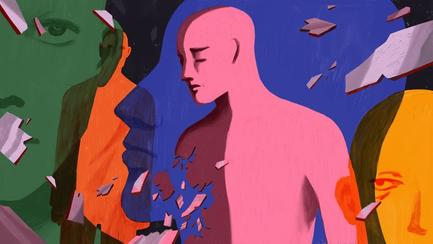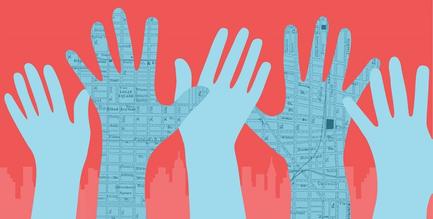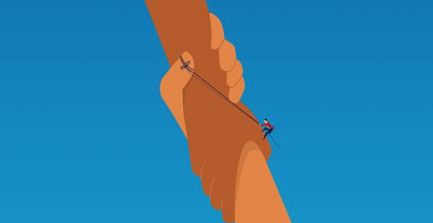Healing Our Nation
Addressing Systemic Trauma with Communities of Color
A Joint Letter from the USA Integrative and Mental Health Community
Power without love is reckless and abusive, and love without power is sentimental and anemic. Power at its best is love implementing the demands of justice, and justice at its best is power correcting everything that stands against love.
― Martin Luther King Jr.
You never change things by fighting the existing reality. To change something, build a new model that makes the existing model obsolete.
― Buckminster Fuller
The time has come to speak out. The recent senseless deaths of Ahmaud Arbery, Breonna Taylor, and George Floyd have been devastating for this nation. We are witnessing a rising tide of global awareness, in which America’s history of racial injustice collides with a massive public-health crisis in minority communities that was previously kept out of sight. While this crisis has been apparent for decades to some medical professionals, society has not adequately addressed an ongoing public-health emergency rooted in racial inequity and racially motivated violence, while widespread grievances go unanswered.
We speak out now as organizational leaders, scholars, educators and US representatives working in integrative and mental health. We are fervently opposed to the ways that racism has impacted not just society at large but also our own fields of study and practice, impeding our mission to bring a healthy life to every level of society. We recognize that racism is a global issue as well. There is an urgent need for dialogue and understanding in every community, because the current emergency is inescapable. We cannot continue to look the other way. Once the hold of racism in our organizations and communities is released, only then can everyone look forward to eradicating systemic racism and its unhealthy, divisive effects.
In this letter we invite every person of conscience to join in a dialogue that extends broadly to governmental leaders and healthcare providers, discussing the links between racism, trauma, and health inequity. There are bridges to be built in areas like police training and mending relationships with communities of color. In that regard, we offer some practical guidelines for fostering resilience and non-violent action beginning now.

Systemic Racism, Trauma and Health Inequities
The US has a long and deep history of racism, which is reflected in ongoing health inequities across communities of color, including the African-American community, the indigenous community and the Latinx community. Disparities in health across these communities of color are vast, well documented and have been described as a result of structural racism. Structural racism is a system that promotes ongoing discrimination and disadvantage through perpetual inequities in housing, education, employment, earnings, benefits, credit, media, health care, and criminal justice sectors. These inequities mutually reinforce each other, creating a system of oppression that drives poor mental and physical health for communities of color. This system of oppression affects the health of African-American, including significantly increasing the risk of death from childbirth, cancer, cardiovascular disease, and homicide.
Structural racism can be viewed as a chronic social and economic disease. For individuals, a flare-up of a disease process is often a crisis that can be viewed as an opportunity for healing. For societies the process is similar. The difference is that instead of focusing on personal issues and lifestyle changes, in order to treat a social disease, societies must focus on economic and policy changes along with changes in heart and mind. While recommending all needed specific economic and social policies is beyond the scope of this letter, consensus frameworks and policy platforms are emerging with growing constituencies aligning on actions across sectors and perspectives. We urge our governmental leaders to dive into these platforms and boldly create and adopt legislation that fosters swift actions needed to close the gap on systemic racism and its perpetuation of health disparities.
Structural racism creates current and intergenerational trauma for people of color. It also weighs heavily on the collective psyche of the nation. The frequent pattern of brutal physical attacks and general lack of regard for the well-being of black and brown citizens by those who are meant to serve and protect, creates persistent, significant trauma and poor health outcomes for adults and children of color all over the nation.
Trauma is also systemic. It does not simply exist in a person’s mind: trauma affects our bodies, our relationships, and our societies. Studies show that trauma affects our and our children’s physical health – through shifts in our immune, cardiovascular, and brain functioning. Research shows that children living in environments fostering social deprivation, disconnection, and dangerousness even show alterations to epigenetic signalling pathways that drive inflammatory responses and therefore create a “DNA imprint” of poor health outcomes at an early age. Historical trauma drives health disparities through psychological, physiological, and social pathways. The trauma that we enable due to our own and our nation’s inabilities to deal effectively with systemic racism is literally killing us and our future generations. The global effects of shock, outrage and protest from the results of racial violence are symptoms of a social disease that must be healed.
Like all living systems, when one part of the system is disrupted it has far- reaching effects throughout the system. Just like in medicine, attempts to suppress symptoms without getting to root causes does not work and often creates more significant long-term problems. The current social and political unrest we are experiencing is one example. History has shown that attempts to suppress this current crisis with force would be a grave mistake. We call upon our leaders to take a systems-based, integrative view and embrace this current crisis as an opportunity for healing our nation.

Targeted Systemic Solutions: Restorative Justice and Skills Training
We applaud the law enforcement officers in states throughout the nation who have intuitively understood the power of restorative justice during these protests. For those officers who took a knee, extended apologies and embraced protestors in our communities, and expressed their grief at ongoing protest events, thank you for contributing to the non-violent healing that is absolutely vital for our nation at this time. Principles of restorative justice, which stem from indigenous cultures and faith traditions, are based in the understanding that human beings and societies are not separate from each other – to the contrary, we are fundamentally, consciously connected. Restorative justice practices are systems-based approaches for healing, which emphasize: 1) inclusion and invited dialogue with persons and communities who have been harmed, 2) accountability and clear reparations by those who have harmed an individual and their community, 3) reintegration and relationship repair, and 4) vows and actions to prevent further harms to the affected persons and communities.
Restorative justice practices help heal individual and collective trauma, which will help heal our fractured nation. Guidelines for healing US racial inequities through restorative justice principles have previously been described by experts in the field and thus will not be repeated here. We call upon governmental officials to forward the principles of restorative justice, instead of instigating the ongoing perpetuation of violence, to aid in the healing of our nation.
Let’s look at law enforcement as one example of a systemic approach to solving structural racism. Police officers work within a system. The system must support officers with 1) a culture that does not tolerate or perpetuate structural racism and 2) training in skills that help to dismantle existing racism. Given all of the difficult and stressful jobs required of them, it is not enough to arm police officers with guns – they must be armed with advanced skills in emotional intelligence and effective negotiation. Furthermore, it would be incredibly inefficient and inconsistent to have 18,000 police departments each attempting to create their own programs for addressing structural racism and related problems. The federal government should create and fund standards and programs in the areas of 1) effective communication 2) nonviolent peacekeeping action 3) conflict de-escalation and resolution 4) negotiation strategies, 5) unconscious bias and 6) racial inequities and racial injustice and 7) stress management and burnout prevention – examples include mindfulness training and other mind-body skill training.
Perhaps the most challenging element is the need for honest discussion among all citizens on how to acknowledge history without repeating it. There must be a mutual understanding of rights that are shared by all citizens – all humans. This type of discussion can be facilitated in each of our organizations, in schools, in corporate environments and in other gatherings where people may currently be reluctant to build a bridge of understanding for fear of retaliation, rejection or ostracization. After the urgency of “we stand with you,” perhaps “we stand together” can become a part of the new normal that is emerging at this time. Ultimately, an admission of a problem is not an admission of guilt. Those who have not shared the African-American experience cannot possibly understand the overwhelming burden that has finally erupted. The response should not be to pretend there is no problem, or to suggest the problem can be resolved by ‘getting over it.’ A willingness to listen to those who have experienced this systemic racism and a commitment to make personal and meaningful adjustments in support of change will make a significant difference. To do nothing will only prolong the pain and trauma.

Resilience Recommendations for Everyone
This is an incredibly challenging time for all of us. For those who feel significantly impacted by the current traumatic experiences in our nation and world, we offer these evidence-based and common-sense suggestions to foster emotional and mental resilience as well as growth:
- Allow your grief and anger to release itself. Grief and anger are natural reactions to the current situation. While you do not want to be consumed by your emotions, you also don’t want to hold them in, as that will not help your mental or physical health. Give yourself the time and space to process your emotions in a way that does not cause physical harm to yourself and others. Witness your emotions as they ebb and flow, focus on your breath, and remember that you are more than any emotional experience you are having. As you get comfortable with the ebb and flow of your grief and anger, you will feel less of a hostage to the current societal situation, and become more aware of what additional information your emotions may be providing to you as they flow through you.
- Seek out support. If you are having thoughts or impulses of harming yourself or someone else, please talk to someone you feel close to who can listen and support you. In addition, you can call the National Suicide Prevention Hotline at 1-800- 273-8255. Please know you are never alone. We are in this together. Being in loving community is the way we will get through this incredibly challenging time – so remember to spend time with someone you love and trust every day – whether a friend, a family member, or a pet – and whether by phone, videoconference or in person. If you are religious or spiritual, connect with God/your Higher Guidance every day.
- Take action. What may seem like the smallest action can make a big difference when we all take non-violent action together. Whether you choose to peacefully protest, donate to organizations who help eradicate systemic racism, or call your congresspeople to urge for racial justice, every action you take towards ending racial injustice is a step toward healing for yourself and our nation. The article Actionable Steps for Therapists (And All Human Beings) In Response to the Racial Pandemic offers many additional steps people can take.
- Take a break. It’s ok to go “off-line” for a while to regain your sanity. Spend some time every day doing something you love, that heals you, so that you are more resilient to the challenges that may lie ahead. That will help you be of better service to others.
- Listen to those communities that have been directly harmed, and recognize where you hold privilege. If you are not African-American, even if you are a person of color or part of a socially disadvantaged group, this is a time to listen and learn from your African-American brothers and sisters, what it feels like to be in their shoes. This is also a time to acknowledge the ways many of us have privilege that we may have not even recognized – whether by gender, race, class or other means. If you have trouble listening because you feel the need to defend yourself or share the ways you are disadvantaged, remember that the purpose of listening is not to make you feel guilty or ashamed. The point is for you to listen to those who have been harmed and hold necessary space for healing during this very tender and transformative time.
Current events leave us no choice but to embrace the call for healing our nation. We must open our collective eyes to truly recognize and repair our broken systems that are based on racism, oppression and the false thinking that perpetuates it – that is, thinking of the “other” as separate from us. With this wisdom, we can move forward as a nation that truly stands for and upholds our self-evident truths and unalienable rights: life, liberty and the pursuit of happiness for all. The health and well-being of our nation depends on it.
Signed (in alphabetical order),
- Raghu Appasani, MD – Founder, The MINDS Foundation
- Susan Bauer-Wu, Ph.D. RN, FAAN – President, Mind & Life Institute
- Judson Brewer MD PhD – Director of Research and Innovation, Brown University Mindfulness Center
- Deepak Chopra, MD, F.A.C.P – Founder, the Chopra Foundation; Clinical Professor, University of California San Diego
- Jude Currivan, Ph.D. – Cosmologist, Healer, Author
- Stephen Dinan, MA – CEO, The Shift Network
- Barbara Dossey, Ph.D., RN, FAAN – International Co-Director, Nightingale Initiative for Global Health Co-Director, International Nurse Coach Association
- Larry Dossey, MD – Executive Editor, EXPLORE
- Donna Eden – Founder, Eden Energy Medicine
- David Feinstein, Ph.D. – CEO, Innersource
- Shoshana Garfield, Ph.D. – Co-Chair Emotional Freedom Techniques International Advisory Board of MISSING (anti-slavery nonprofit)
- David Germano – Executive Director, UVA Contemplative Science Center
- Joseph Goldstein – Co-Founder, Insight Meditation Society
- Lisa Gordon – Owner and CEO, Healing Touch Program Founder, Energy Medicine Professional Association
- Mimi Guarneri, MD, FACC, ABOIM – Co-Founder, Miraglo Foundation; Founding President, Academy of Integrative Health & Medicine; Clinical Associate Professor, University of California, San Diego
- Richard Hammerschlag – Co-Director, Consciousness and Healing Initiative; Dean Emeritus of Research, Oregon College of Oriental Medicine
- Charlie Hartwell – Partner, BridgeBuilders Collaborative
- Rev. Dr. Wayne C. Hopkins – Pastor, First Timothy Missionary Baptist Church
- Ronit Herzfeld, MSW – Founder and CEO, Leap Forward
- Shamini Jain, Ph.D. – Founder and CEO, Consciousness and Healing Initiative; Assistant Professor, University of California San Diego
- Jack Kornfield PhD – Founder Spirit Rock Center
- Azim Khamisa – Founder, Tariq Khamisa Foundation
- Tasreen Khamisa – Executive Director, Tariq Khamisa Foundation
- Rauni King, RN, MIH, BSN, CHTP/I, HNB-BC – Co-Founder, Miraglo Foundation; Executive Director, Guarneri Integrative Health, Inc.
- Claire Lachance, MBA – CEO, Institute of Noetic Sciences
- Bruce Lipton, Ph.D. – Biologist and Pioneer in Epigenetics
- Poonacha Machaiah – Co-Founder, NeverAlone, Chopra Foundation
- Rollin McCraty – Research Director, HeartMath Institute
- Julia Mossbridge, Ph.D. – Executive Director, The Institute for Love and Time
- David Muehsam, Ph.D. – Co-Director of Research and Innovation, Consciousness and Healing Initiative
- Tyler Norris, MDiv – CEO, Well Being Trust
- Tabatha Parker, ND – Executive Director, Academy of Integrative Health and Medicine (AIHM)
- Eva Patel – Board Member, Consciousness and Healing Initiative Entrepreneur
- Maureen Pelton, MSSW, LICSW – Partner, BridgeBuilders Collaborative
- Jan Phillips, M.A. – Founder, Livingkindness Foundation
- Stephen W. Porges, Ph.D. – Distinguished University Scientist Founding Director, Traumatic Stress Research Consortium Kinsey Institute, Indiana University
- Carmen Pulido, Ph.D. – Director Mind Health Psychology; Core Faculty, Fielding Graduate University; Assistant Clinical Professor, University ofTexas Medical Branch
- Lissa Rankin, MD – Founder, Whole Health Medicine Institute
- Tim Ryan, OH-13 Representative, United States Congress; Co-Chairman, Military Mental Health Task Force
- Sharon Salzberg – Co-Founder, Insight Meditation Society
- Josue Sejour – Founder & CEO, Global Conscious Media (GCM)
- Robert Schwarz, PsyD, DCEP – Executive Director, Association for Comprehensive Energy Psychology (ACEP)
- Rudoloph Tanzi, Ph.D. – Joseph P. and Rose F. Kennedy, Professor of Neurology Harvard Medical School, Vice-Chair of Neurology; Director, Genetics and Aging Research Unit at Massachusetts General Hospital
- Kelly A. Turner, Ph.D. – Founder, Radical Remission Project
- Cassandra Vieten, Ph.D. – Executive Director, John W. Brick Foundation for Mental Health
- Amelia Vogler, MS, HTCP/I – Executive Director, Healing Touch Professional Association
- Jeffrey C. Walker – Chairman, New Profit Vice Chair, United Nations Envoy’s Office for Health Finance and Malaria
- John Weeks – Editor-in Chief, JACM-Paradigm, Practice and Policy Advancing Integrative Health; Publisher, The Integrator Blog
- Ruth Westreich – President, The Westreich Foundation
- Len Wisneski, MD, F.A.C.P. – Clinical Professor of Medicine, George Washington University Medical Center; Chair Emeritus, Integrative Health Policy Consortium
This joint statement was first published by our collaborators at the Consciousness and Healing Initiative.
If you’d like to comment or sign onto this statement, simply go to https://www.chi.is/healing-our-nation/ and scroll to the bottom to sign and comment.
Services
New Client Consultations
Established Client Consultations
Intuitive Channeled eReadings
Mentoring
Spiritual Community
Meditations & Affirmation Recordings
Grounded (Meditation CD)
I AM I (Affirmations of the 13 chakras)
Vogler Institute
Personal Healing Programs
Professional Classes
Surgical Specialty
Energy Medicine in Surgery
Hara Healing
Monthly Healing Clinics LIVE
Personal and Professional Training

Contact Us
Mail • Instagram • Facebook
Legal Policy • Privacy Policy
© Copyright 2015 – 2025 The Healing Space, LLC. All Rights Reserved.
Services
New Client Consultations
Established Client Consultations
Intuitive Channeled eReadings
Mentoring
Spiritual Community
Meditations & Affirmation Recordings
Grounded (Meditation CD)
I AM I (Affirmations of the 13 chakras)
Vogler Institute
Personal Healing Programs
Professional Classes
Surgical Specialty
Energy Medicine in Surgery
Hara Healing
Monthly Healing Clinics LIVE
Personal and Professional Training

Contact Us
Mail Instagram Facebook
Legal Policy • Privacy Policy
© Copyright 2015 – 2025 The Healing Space, LLC. All Rights Reserved.
